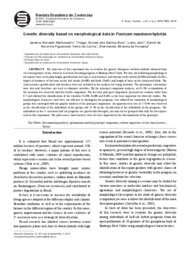Genetic diversity based on morphological data in Panicum maximum hybrids.
Genetic diversity based on morphological data in Panicum maximum hybrids.
Summary: The objective of this experiment was to evaluate the genetic divergence between hybrids obtained from 10 sexual genitors of the Panicum maximum breeding program at Embrapa Beef Cattle. For this, the following morphological descriptors were used: plant height, growth habit, leaf aspect, leaf waxiness, hair density on the sheath (DePB) and blade (DePL), degree of hardiness of the hairs on the leaf sheath (DuPB) and blade (DuPL) and length of hairs on the sheath and blade. The characteristics growth habit and waxiness were not included in the analysis for being invariant. The phenotypic correlations were low and, therefore, not used to eliminate variables. By the principal component analysis, an 84.3% accumulation of the variation was observed until the fourth component. The last four principal components presented an estimate lower than 0.7 and allowed the identification of the variables DePB, DuPB and DuPL as the least important for diversity studies. The morphological characters used were not efficient to distinguish the progenies, but allowed the formation of morphological groups that converged with the graphic analysis of the principal components. An apparent error rate of 17.04% was observed in the classification of the individuals in the groups and 55.5% in the classification of the individuals in the progenies. The individuals in the P. maximum half-sib progenies are genetically divergent, but may not be grouped with only the descriptors used in this experiment. The pubescence characteristics were the least important in the discrimination of the genotypes.
Publication year: 2012
Types of publication: Journal article
Unit: Embrapa Beef Cattle
Observation
Some of Embrapa's publications are published as ePub files. To read them, use or download one of the following free software options to your computer or mobile device. Android: Google Play Books; IOS: iBooks; Windows and Linux: Calibre.
Access other publications
Access the Agricultural Research Database (BDPA) to consult Embrapa's full library collection and records.
Visit Embrapa Bookstore to purchase books and other publications sold by Embrapa.

